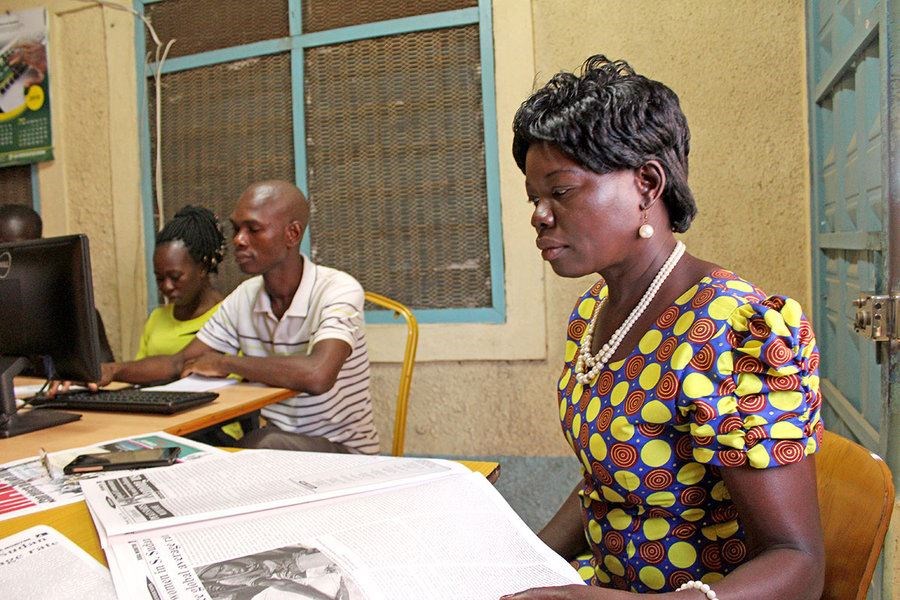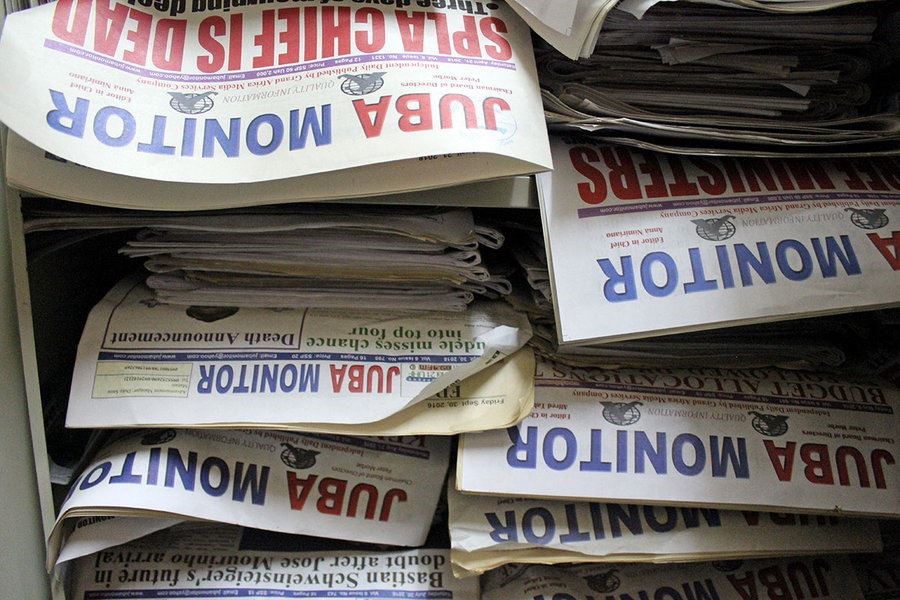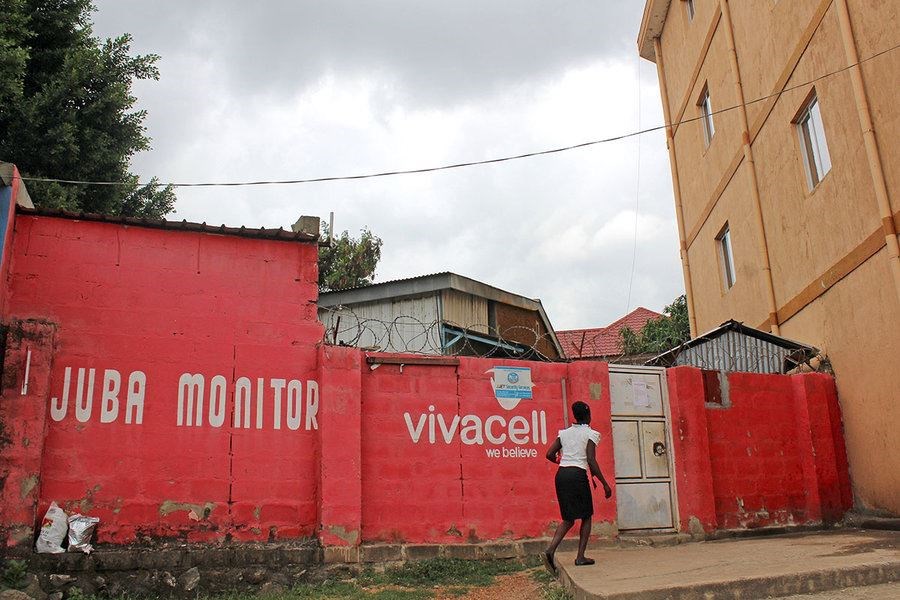Reprinted with permission from The Christian Science MOnitor
The obstacles reporters face in doing their work – the stories behind their stories – can say just as much about a country’s concerns and challenges as the articles they produce.
OCTOBER 4, 2018 - JUBA, SOUTH SUDAN - On the bottom shelves of a slumping metal cabinet, beneath a wad of receipts and a lifeless old laptop, sits a first draft of South Sudan’s history, told in bold print headlines.
 Anna Nimiriano leads a morning news meeting at the Juba Monitor. She is the first female editor in chief in the South Sudanese newspaper’s history.Ryan Lenora Brown/The Christian Science MonitorLike the history it has recorded, the archives of the Juba Monitor are jumbled and missing crucial pages. The issues jammed into the cabinet lurch between tales of civil war and stories of peace agreements being hammered out in faraway cities. Some copies are ripped. Some dates are missing outright. But those that remain tell the story of a brand-new country’s brisk undoing, observed from the inside.
Anna Nimiriano leads a morning news meeting at the Juba Monitor. She is the first female editor in chief in the South Sudanese newspaper’s history.Ryan Lenora Brown/The Christian Science MonitorLike the history it has recorded, the archives of the Juba Monitor are jumbled and missing crucial pages. The issues jammed into the cabinet lurch between tales of civil war and stories of peace agreements being hammered out in faraway cities. Some copies are ripped. Some dates are missing outright. But those that remain tell the story of a brand-new country’s brisk undoing, observed from the inside.
These are not the headlines Anna Nimiriano imagined writing when, as a young reporter in July 2011, she wandered through downtown Juba the day South Sudan became independent from Sudan, asking anyone who would stop for their views of the country’s future.
 The archives of the Juba Monitor, stored in a cabinet in the paper's offices in South Sudan's capital, hold the first draft of the young country's history.Ryan Lenora Brown/The Christian Science MonitorStrange women hugged her. Men wept. Her notebooks filled with an earnest, unpunctured optimism. This will be a great country, they said. I am proud to be a South Sudanese. The future is beautiful.
The archives of the Juba Monitor, stored in a cabinet in the paper's offices in South Sudan's capital, hold the first draft of the young country's history.Ryan Lenora Brown/The Christian Science MonitorStrange women hugged her. Men wept. Her notebooks filled with an earnest, unpunctured optimism. This will be a great country, they said. I am proud to be a South Sudanese. The future is beautiful.
But seven years later, as the editor in chief of one of the country’s most circulated English-language newspapers, Ms. Nimiriano sits watch over a paper that is both a record of the country’s immense turmoil and an institution struggling to withstand it.
Some days, that means bartering with soldiers to let her colleagues out of jail. On others, it means haggling over the price of petrol needed to keep the office generator running. Sometimes, her biggest fight is to drive home in the evening without being stopped by soldiers at roadblocks, who are sometimes swaying and smelling of alcohol. She must be a prostitute, they taunt – no good woman would be out so late on her own.
Five years ago, a rivalry between President Salva Kiir and his deputy, Riek Machar, spiraled into a brutal civil war which, by one count, has killed 380,000 people in a population of just 12 million. One third of the population has been displaced.
“Sometimes, when you see so much going wrong, you realize there is nothing you can do but write it down,” she says. “Every day, you must write it down.”
But writing down what is happening in South Sudan is not a simple task. Despite a constitution that provides for press freedom, in practice the country’s government has had little patience for its critics – especially when they come armed with microphones and notebooks. Today, the country ranks 144th out of 180 countries on the Press Freedom Index compiled by Reporters Without Borders. At least seven journalists have been murdered – either in the course of their work or in targeted assassinations – since the start of the civil war in 2013.
 The Juba Monitor takes strict security precautions, including 24-hour security, to discourage individuals and government officials from threatening its reporters.Ryan Lenora Brown/The Christian Science Monitor“Freedom of the press does not mean you work against the country,” Mr. Kiir told journalists in August 2015. “If anybody among them (journalists) does not know that this country has killed people, we will demonstrate it one day, one time.”
The Juba Monitor takes strict security precautions, including 24-hour security, to discourage individuals and government officials from threatening its reporters.Ryan Lenora Brown/The Christian Science Monitor“Freedom of the press does not mean you work against the country,” Mr. Kiir told journalists in August 2015. “If anybody among them (journalists) does not know that this country has killed people, we will demonstrate it one day, one time.”
Some mornings, the Juba Monitor staff would arrive in the office to find that one of their stories had simply been cut out of the paper, a mute, blank page left in its wake. Most of the time, that meant Nimiriano had received a call late the previous night from the country’s security forces, who waited each evening at the printer’s office to read the next day’s paper. When they didn’t like something, they’d tell her it was out. No discussion.
There was no discussion either when Nimiriano, then the paper’s managing editor, and her boss Alfred Taban were summoned for questioning by the country’s security forces in July 2016. The article that had drawn their ire was an opinion column by Mr. Taban that called for the resignation of the country’s president and vice president, after fighting between forces loyal to the two left dozens dead in the capital the week before.
By the time the meeting was over, Mr. Taban had been arrested. And Nimiriano was told to shut the paper down immediately.
Outside, rebels were spraying the walls of the presidential palace with bullets. On the city’s edge, government soldiers swarmed a hotel complex, gang raping several women and executing a young journalist named John Gatluak Nhial – allegedly for his ethnicity.
But two days later, Nimiriano marched back to the prison. “It doesn’t help anything to close the paper,” she told the officials who had arrested Taban. “And our editor is a sick man. If he dies, that will be on your conscience.”
Soon after, the government gave the go-ahead for the paper to re-open. Ten days later, Taban came out of prison. (The following year, he left journalism for politics and is now a member of parliament.) The fighting, meanwhile, slowly receded from the capital.
And so, as always, the paper carried on.
Day-to-day, however, the paper’s more prosaic problems continued.
In August 2017, a massive fuel shortage gripped Juba. No petrol meant no generators, and no generators meant the Monitor’s printer couldn’t print. For several days, the paper stopped production. Soon after, Nimiriano was appointed editor in chief.
Meanwhile, the country’s currency continued a long tumble. By June 2018, the paper cost 100 South Sudanese pounds – 50 times the price at independence seven years earlier. To keep up with rising costs, Nimiriano cut circulation from 2,000 copies daily to 1,500.
“Sometimes there is a risk of focusing on all the problems around you instead of the work at hand,” she says.
And so, as best she can, she tries not to think of the five men with pistols who came recently to her office to threaten her over an error in a story about the military. She tries not to think of the time, driving home, when a soldier forced her from her car on a black stretch of road and made her kneel in the mud, demanding to know what kind of woman she was. She doesn’t think, either, of the whispers that ran through the newsroom when she became the Monitor’s first female editor a year ago. Or of the incredulousness that courses through her daily as she reads incoming stories about the hunger and death that stalk the civil war, as she thinks of her own childhood memories of fleeing, of life in tented camps, of praying for independence. She tries not to wonder too often, is this what our country fought for, when we battled for decades for independence?
Instead, Nimiriano does her best to keep her eyes on what’s ahead of her. On a recent morning in August, at the daily staff news meeting, there was stories about the Muslim festival of Eid and the government releasing results for secondary-school exit exams. Twelve hundred miles away, in the Sudanese capital of Khartoum, South Sudan’s leaders were negotiating for peace. There would be a story on that, too. And after that, on whatever came next.
Support for the reporting of this story was provided by the International Women’s Media Foundation.
Page created on 10/5/2018 5:14:41 AM
Last edited 10/5/2018 5:59:37 AM
